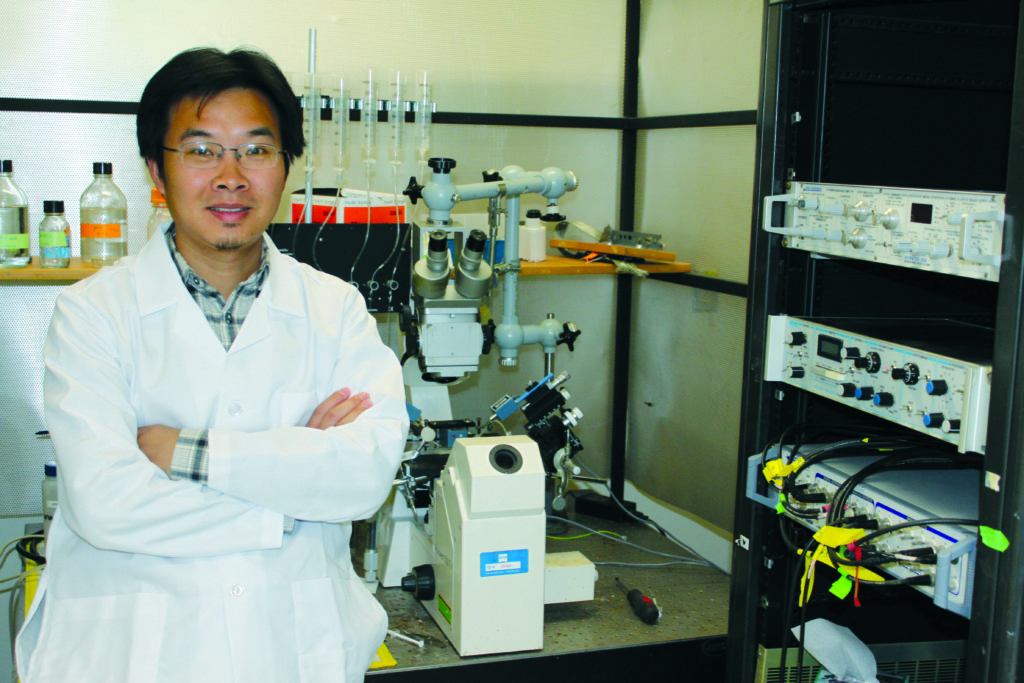
Advancing Breakthrough
Drugs
Advancing Breakthrough
Drugs
Young scientists get support to discover tomorrow’s cures.
To succeed in drug development, scientists must be able to demonstrate that their research is of great need or value and that it furthers progress toward treatments that will change the lives of patients. But many promising studies never see the light of day because they lack a strong backer and the resources that come with it. That’s where my work comes in.
As president of the PhRMA Foundation, an organization devoted to scientists who discover new medicines, I’ve overseen the awarding of grants and fellowships to young investigators on the cusp of extraordinary medical breakthroughs. These young scientists include people like Lyndsey Anderson, a postdoctoral fellow at Northwestern University who is studying how genetics can make us more or less susceptible to drug interactions. Or Michelle Ormseth, a medical professor at Vanderbilt University who is exploring the links between rheumatoid arthritis, cholesterol and heart attacks. Professor Jun Wang of the University of Arizona used funding he received from the Foundation to test a vital anti-influenza drug.
In short, we offer researchers across a variety of relevant areas the support they need to pursue their own interests. Epilepsy, hypertension, HIV, chronic pain – these are just a few of the areas where the PhRMA Foundation is supporting scientists who are bringing crucial treatments to patients in need. And most of our grants are unrestricted, giving awardees the autonomy to take up the projects that most inspire them.
If a young postdoc wants to build a lab, for example, he or she can do that. Their research – the research we have supported – has helped patients around the globe live longer, healthier lives. It has fostered positive health outcomes for minorities and widened treatment access for people in low-income areas. Sustained funding makes all of this possible.
For early career scientists, grants and fellowships are also validating. They build confidence and serve as a springboard for continued funding. Over our 50 years in operation, we have awarded more than 2,300 brilliant, budding scientists with awards ranging from $20,000 to $120,000 a year – totaling about $80 million in grants. These are the trailblazers who are making significant drug discoveries, starting pharmaceutical companies, leading regulatory agencies like the Food and Drug Administration (FDA) and the National Institutes of Health (NIH), and improving the lives of patients around the world. In fact, more than a quarter of the research conducted by our award recipients has led to one or more clinical trials. Seventy percent have had their research backed by the NIH. And 8,000 medical students have been taught, trained and mentored by Foundation grantees.
Perhaps most rewarding is that the research we fund has a clear and measurable impact. Take, for example, the work of Dr. Susan Band Horwitz. As an early recipient of our Research Starter Grant, which supports young scientists beginning their careers as independent researchers, Dr. Horwitz studied the molecule Taxol, a byproduct of the Pacific yew tree that slows the growth of cancer cells. More than 40 years after she was awarded our grant, Taxol is now one of the most successful oncology treatments in the world. The drug has been prescribed to more than 1 million patients. The $13,000 grant we provided enabled her to establish her labs and begin her work, setting the stage for future national funding she applied for and received. Today, our Research Starter Grants are $100,000 a year.
Throughout my 17 years with the Foundation, I have had the opportunity to travel across the country and meet with these incredible young men and women. Time and again, awardees tell me they would never have been able to continue their research or make the connections they need without our support. Getting a solid grant in the medical research world is like landing your first job. Once you’re in, the doors tend to keep opening. Scientists need to generate that initial compelling core of evidence to take their careers to the next level, and we provide the financial wherewithal to do that and with no strings attached.

Jun Wang, Ph.D., of the University of Arizona won a Research Starter Grant in Pharmacology/Toxicology from the PhRMA Foundation.
Our work at the Foundation also goes beyond funding the research of individual scientists. Over the past few years, we have launched initiatives to support biomedical research and training that will help jumpstart research into new breakthrough advances and improve patient outcomes. Grant programs under these efforts range from $200,000 to $540,000 a year. And we prioritized a federal effort to advance regulatory science, an evolving discipline that will facilitate innovation and enhance the development of safe and effective medical products to improve public health. As part of that effort, we developed a rotations program in which students observe real work in this interdisciplinary field. Ultimately, the program aims to ensure a robust pipeline of well-trained scientists who can create and use new tools, standards and methods to improve the drug development process.
Our goal is not just to help find the next breakthrough that can save people’s lives but to ensure that the medicines we have already developed can provide maximum benefit to patients. For example, in 2009, we launched an educational program in “comparative effectiveness” research (CER), which can help doctors more easily determine what treatments will work best for individual patients. We also built a framework for CER training and certification with CER Centers of Excellence at six prestigious institutions: Johns Hopkins University, the University of Washington, the Harvard School of Public Health, the University of Utah, the University of Maryland and the University of Illinois at Chicago. This framework helped develop the infrastructure within universities throughout the United States for this important new discipline.
We’ve also invested more than $1 million in a program to help patients stick with the medications they’ve been prescribed and take them the right away. Every year, “non-adherence” puts a $100 billion to $289 billion strain on America’s health care system when patients miss a dose or take their medicines improperly.There are many reasons why people find it difficult to stay the course with their medicines. Understanding these barriers, however complex, is the first step in improving adherence.
The PhRMA Foundation is also backing high-quality, patient-centered approaches to “value assessment,” the development of methods for assessing the value of medical tests, treatments and health care services. Although still evolving, value assessments can empower health care decision-making and ensure the right treatments reach the right patients at the right time. But frameworks that are not well-constructed or are misused put patient access and continued innovation at risk. We have the capacity to promote sound methods and infrastructure for conducting rigorous, patient-centered value assessment.
In the end, all of us at the PhRMA Foundation know it takes a village to grow a skilled workforce of medical professionals who can translate research into real and sustainable health care improvements. That’s why we have partnered with federal agencies like the FDA, NIH and the Agency for Healthcare Research and Quality.
The virtue of drug development lies in its potential to eliminate disease and alleviate pain, and our investment in the most promising scientists and the most innovative research has given so many people the chance to live healthier, happier lives. There’s simply no greater return. But I know we have just scratched the surface of drug discovery. A vast world of knowledge about the human body and medicine awaits, and research holds the key.
Eileen Cannon is president of the PhRMA Foundation.
Philanthropy
PhRMA Foundation
Project
Drug Development Research


